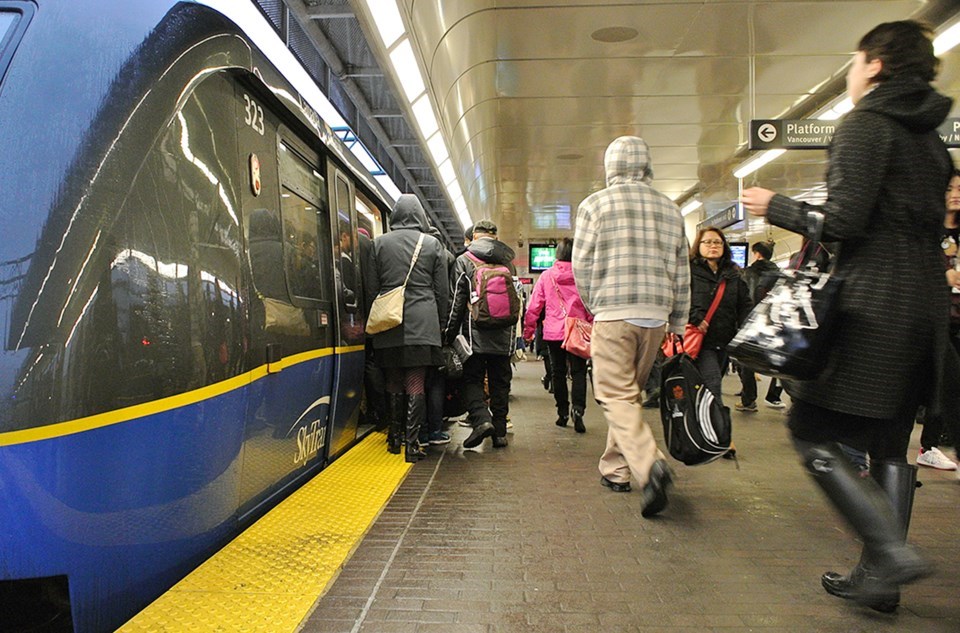Immigration has historically been the largest component of growth in Metro Vancouver, but TransLink planners are warning an anticipated significant increase of newcomers in the next few years will put further pressure on transit and the roads.
The federal government has plans to welcome 465,000 new permanent residents to Canada in 2023, increasing to 500,000 in 2025. Previously, Metro Vancouver has accounted for 11 per cent of immigration settlement, averaging to roughly 36,000 people per year.
Lower Mainland mayors heard in a recent presentation from TransLink planner Nick Lovett that Metro Vancouver could see about 50,000 new immigrants coming to the region annually by 2025 — and many will rely on the transit system.
"Recent immigrants and [non-permanent residents] such as students and temporary visa holders are more likely to rely on transit," Lovett told the mayors in March. "This is because of where they settle in the region — close to transit and transit-oriented development areas."
Historically, many new immigrants have settled south of the Fraser River in Surrey and other communities and landed jobs where working from home is not an option. Lovett pointed to jobs in construction, manufacturing and warehouses as examples.
Data from the 2021 census shows a correlation between areas with recent immigrants and non-permanent residents and transit commute mode share, reinforcing observations from immigrant settlement agencies that new Canadians rely heavily on transit.
'Labour force needs'
A report that accompanied Lovett's presentation said the findings underscore the importance of transit in meeting labour force needs and settlement of immigrants, who play an essential role in the economy.
"B.C. has very low rates of natural population growth — births minus deaths — and so it's highly reliant on immigration to meet labour force needs," Lovett said.
"One hundred per cent of labour force growth is attributable to immigration. This is also true of Canada as a whole. So this is why the federal government is raising immigration targets. Of course, this does have an impact on the region."
While the higher-than-forecast immigration levels are not necessarily expected to persist long-term out to 2050, Lovett said they add to the immediate pressures facing the transit and transportation systems.
That pressure prompted the Mayors' Council on Regional Transportation to make several recommendations to the federal government in February, arguing for more investment to accommodate population growth, including $250 million in "emergency transit relief funding" to be matched by the provincial government.
A news release that accompanied the document noted the present demand on TransLink, with boardings already at 82 per cent of pre-pandemic levels — the highest among North American cities.
"Overcrowding on the system, especially south of the Fraser and other fast-growing communities, is approaching levels not seen since before the pandemic when TransLink was struggling to keep up with surging demand," the release said.
$479M for TransLink
The provincial government responded in March to the mayors' calls for more funds, announcing $479 million for TransLink — an investment noted at the March 24 mayors' meeting by Port Coquitlam Mayor Brad West, who doubles as chairperson of the mayors' council.
"It was important because the alternative to the province stepping up was significant service reductions to our region, increased congestion and poor outcomes for all of our communities," West said.
"So I'm very pleased that we were able to avert that alternative that, unfortunately, a number of cities across North America are having to contend with. That being said, our work is far from over. We know that we need to bring the federal government to the table. That's an absolute imperative."
Part of that ask of the federal government is to develop a new funding model for public transit that is more resilient and equitable by avoiding overreliance on transit fares and property taxes.
Nearly half (41.8 per cent) of Metro Vancouver's 2.6 million residents were born outside of Canada, with one out of every 17 people having immigrated since 2016. In the 2021-2022 year, the region witnessed record levels of immigration, partly due to COVID-suppressed numbers in 2020-2021.




